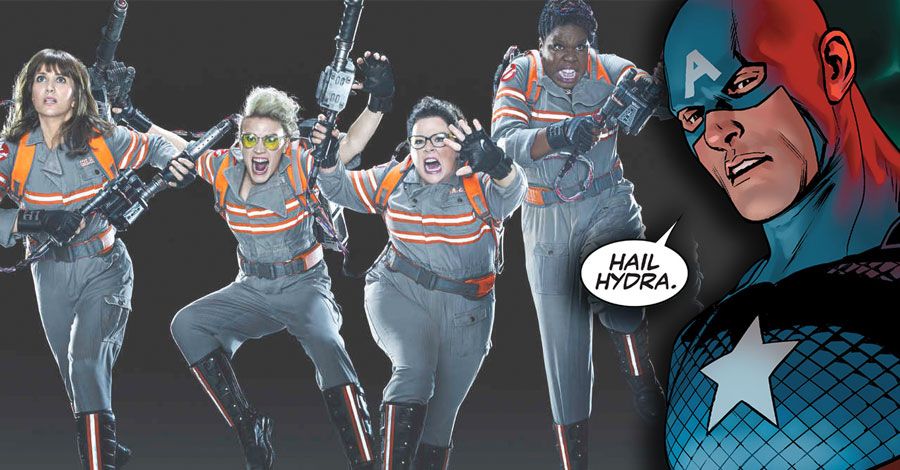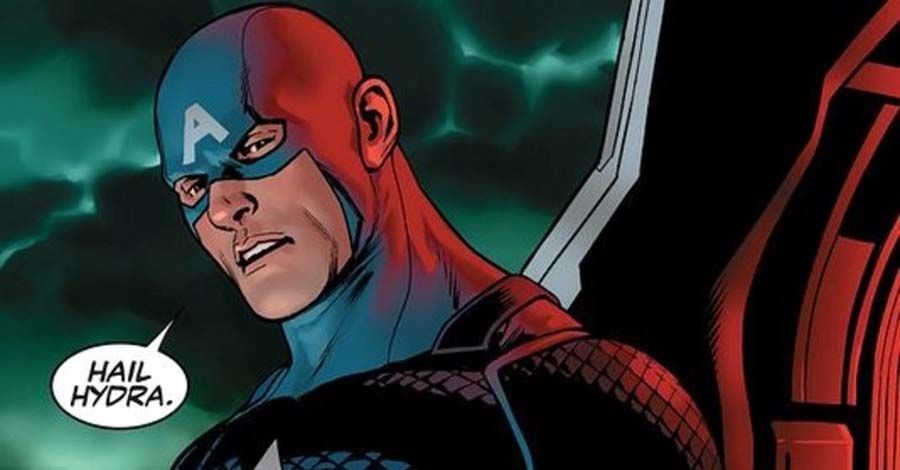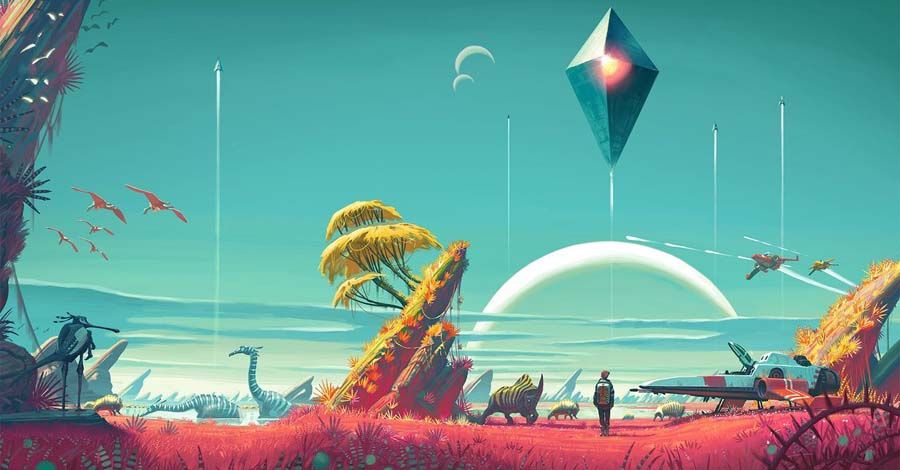There's a lot of anger among fandom. Critics have even dubbed it "outrage culture," a phrase that lumps together everything from indignation about the latest reboot to complaints about the gross objectification of women to calls for more diverse representation, as in the #GiveElsaAGirlfriend campaign. It conflates the reasonable with the hotheaded, the passionate discussion with the abusive tirade. And sure, it's no secret there are toxic elements of comics fandom -- and gaming fandom, and movie fandom, etc. -- folks who not only complain about story or character elements they don't like but who are actively abusive toward the comics' creators and anyone who dares contradict or confront them.
Women, people of color and LGBT folk get the worst of it; none of that's news, and as your resident cis-het white guy, I'm not the right voice to delve once more into the full spectrum of online vitriol and harassment. Instead, I'm just going to address the anger. If everyone is angry, or angry that everyone else is angry, or laughing at the people who are angry about something they don't think is worth getting upset about, where does it come from, and where does it end?
RELATED: Stan Lee Weighs in On Marvel's Controversial "Captain America" Twist
Devin Faraci's recent essay comparing fan culture to the sadistic villain in Stephen King's "Misery" had a lot of people nodding in agreement, prompted a fair amount of criticism and elicited more than a few subtweets questioning the writer's standing to make such an argument. Faraci uses the word "entitlement," which is not unproblematic, both in usage and effect. Labeling a reaction as entitlement allows one to belittle or dismiss a point of view without considering it. For now, however, let's just consider the anger itself, and its roots in the ownership fans have come to feel.
Let's take, for example, the ongoing garment-rending over the "Ghostbusters" reboot, which had another ugly episode this week and will almost certainly continue to flare up until the movie's release in July, and likely beyond. Setting aside for a moment the misogynistic tone of many of the complaints -- don't worry, we'll come back to it -- let's consider what it means to be a fan, in this case a male "Ghostbusters" fan. Let's try to get a handle on the source of the anger.
Let's say you're a 5-year-old boy in 1984 when "Ghostbusters" arrived in theaters. The scenario we're following can largely apply to younger people as well, but let's draw a picture of someone who was there at the beginning: You see the movie on the big screen, and you're blown away. You get all the toys, you watch the cartoons. And in earlier generations, maybe you'd see the movie on TV once or twice, or when it came to the bargain theater. But you're a child of the '80s (or the '90s, or the '00s) -- you can own it on home video and watch it as often as you like, as you grow up, as the sequel comes out, as you acquire a new appreciation for it in high school and watch it with friends in your college dorm. This continues.
"Ghostbusters" feels like a part of you.
And then, three decades later, a new movie is announced, and it doesn't feel like "Ghostbusters" to you.
Melissa McCarthy Responds to "Ghostbusters" Backlash
I'll stop here to note that, while the demographic sketch is accurate, I didn't have this ongoing, deeply personal connection to "Ghostbusters." I liked the movie as a kid, I had the soundtrack and the toys, but that's kind of all it was to me. A good pair of movies, that, sure, I enjoyed again with friends when I was older. Still, I get the impulse.
But that's about as far as I'm going to defend that, because the ugliness of the hate directed at the female-led "Ghostbusters" is indefensible, and something that's been well-covered, if not necessarily well-addressed. Weirdly, I don't think the root cause of the fan rage is misogyny, though it gets there quickly enough -- it's a rage combo, then, one part based in cultural investment and the other in something that is not unique to fandom, something that gives rise to things like "men's rights activists": a sense of frustration borne of lost influence, real or perceived. Men used to be able to ghost-bust, tell bawdy jokes and snap towels in peace. Any defense of the new movie, even from O.G. (Original Ghostbuster) Dan Aykroyd then must be rooted in pandering to political correctness.
I might as well state the obvious: The feeling that pop culture is a part of you and is something we desire is why people cling to it so tightly. And that's part of why representation matters -- seeing yourself in pop culture is vital to taking possession of it. But again, better and more appropriate voices than mine have covered this.
Meanwhile, something quite different is going on concerning the big reveal in "Captain America: Steve Rogers," but the roots may be similar. Kicking off new series that returns the shield to Steve Rogers once again, writer Nick Spencer and artist Jesus Saiz unveiled the shocking truth that not only is the Sentinel of Liberty secretly a member of Hydra, but he always has been.
As a story point in a comic, it's a pretty interesting development. But of course, Captain America doesn't simply exist as a fictional character with ongoing heroic adventures; he means something. He has "America" in his name, after all. He's been built up, over the course of 75 years, to represent all that is good about our country. To have all of his adventures recast as the machinations of an agent of a Nazi-affiliated terror group is understandably unnerving. And there are a few bothersome aspects. When I told my wife, who doesn't follow comics, about Captain America's heel turn, she said, "That's a bit disrespectful to people in the armed services, isn't it?" Plenty of people have noted that character's creators, Joe Simon and Jack Kirby, were the children of Jewish immigrants. A colleague at work said her college-age son was nearly in tears because of what breaking the ideal of Captain America said about the country, or what it gave people permission to do; with Donald Trump ascendant and Steve Rogers turned traitor, who would stick up for the everyday people? Where is our moral compass?
Kevin Smith Gives His Take on the Big "Captain America" Twist
The counter-argument, of course, is that nothing is forever in comics, which is true as far as it goes. But there's condescension in this line of thought -- "If you're upset, you clearly don't understand how comics works" -- and moreover, it discounts the cultural impact and misunderstands how the world outside of comics views something like this. Remember, "Captain America is a Nazi" is a mainstream news event; the resolution of that story isn't. There are people who believe that no Superman comics have been published since 1993, when the Man of Steel famously died at the hands of Doomsday; that became clear during the dust-up a few years ago when Superman renounced his citizenship, and some of the flaming-hot commenters were surprised Clark Kent was still alive to betray Truth, Justice and the American Way. You can argue that, well, these people clearly weren't buying comics so who cares, but tarnishing our idols in the popular imagination isn't nothing.
Are both sides overstating their case? Very likely. Trump can do (and by many accounts, has already done) more damage with his demagoguery than Spencer can by turning Captain America rogue. And if we shouldn't get worked up because "it's just comics!" then why read comics at all? We care about these characters, and so we feel it when our heroes fall.
It's OK to be angry about comics. There are some legitimate things to get angry about -- maybe Captain America's "Hail Hydra" is one of them. But if fear leads to anger and anger leads to hate, it's not hard to see what comes next. Yes, death threats.
We can all agree that death threats, no matter the target or who's making them, are bad, correct? We can also agree that a few nutters making death threats doesn't negate the validity of their position -- assuming there was any validity to begin with? We can, right? One can express anger at developments in "Captain America" in a reasonable, or even heated, manner, and this is justifiable even if not everyone finds it warranted; but no matter how sound your argument against Captain Hydra, it's still inexcusable to threaten the life the writer or, FFS, James Gunn's cat because the director backed Spencer's play. These are real things that happened. However, they're not the first, not by a long shot.
But maybe it doesn't matter that we love "Ghostbusters" or Captain America. Because there have also been death threats related to the delay of "No Man's Sky," a video game that, while hotly anticipated, carries zero cultural weight at this point. And the first round of threats were directed at the reporter who broke the news. Once the delay was confirmed, though, the malcontents directed their violence toward the developers, and no, that's not any better.
Does it, then, really just come down to lashing out? To seeing something we don't like and, powerless, striking back at those who have offended us, verbally with the threat of more? Because it's not just fandom, guys. Not at all. Outside of online communities, the closest analogue seems to be road rage, an environment in which a person can feel anonymous, at once isolated and surrounded by others, whose actions and intentions are unpredictable. If someone cuts you off while driving, your options are limited. You can shout. You can honk your horn. You can drive more aggressively. And, in rare tragic occurrences, some people strike back physically, violently. That happens. And we're putting the fear of this sort of retaliation into people who make entertainment, for no better reason than we are not -- or, even, are unwilling to be -- entertained.
The problem isn't fandom, or "entitlement" as Faraci defines it. The problem is our mode of communication, an ever-present conversation that both makes it possible to tell our favorite creators just how much we loved their latest comic but also enables us to abuse those same people when they displease us.
It's OK to be angry. It can be cathartic to complain online, even directly to the creators -- and it can even be beneficial if there is a cultural imperative. Writers James Robinson, J.M. DeMatteis and the "Batgirl" team of Cameron Stewart, Brendan Fletcher, and Babs Tarr, when confronted with story elements that were considered hurtful to transgender readers, took their Twitter lessons to heart; not every creator is so gracious, but every now and then, some are.
However, we need to recognize when to pull the car over, get out, and instead rail about Captain America or "Ghostbusters" to anyone nearby. Your coworkers will get a kick out of it, really. Your S.O. will put up with it, within reason. And you won't become an online pariah or worse. Not today, anyway.




